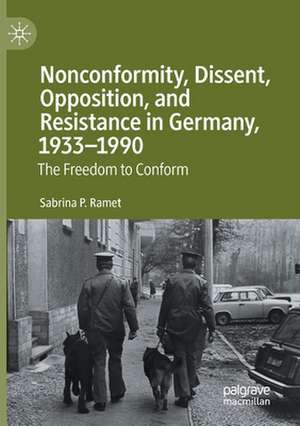Nonconformity, Dissent, Opposition, and Resistance in Germany, 1933-1990: The Freedom to Conform
Autor Sabrina P. Rameten Limba Engleză Paperback – 30 oct 2021
“This book brings fresh light to previously marginalized subject in German history. It is an original approach, up-to-date written without scholarly jargon, easily accessible to students, both at undergraduate and graduate. It is highly focused departing from the usual “histories” of a single country arguing for the “two German states”, and the three political systems.”
- Prof. Dr. László Kürti, Institute of Applied Social Sciences, University of Miskolc, Hungary
| Toate formatele și edițiile | Preț | Express |
|---|---|---|
| Paperback (1) | 639.73 lei 6-8 săpt. | |
| Springer International Publishing – 30 oct 2021 | 639.73 lei 6-8 săpt. | |
| Hardback (1) | 645.14 lei 6-8 săpt. | |
| Springer International Publishing – 30 oct 2020 | 645.14 lei 6-8 săpt. |
Preț: 639.73 lei
Preț vechi: 752.63 lei
-15% Nou
Puncte Express: 960
Preț estimativ în valută:
122.44€ • 127.35$ • 102.61£
122.44€ • 127.35$ • 102.61£
Carte tipărită la comandă
Livrare economică 13-27 martie
Preluare comenzi: 021 569.72.76
Specificații
ISBN-13: 9783030554149
ISBN-10: 3030554147
Pagini: 279
Ilustrații: XXIII, 279 p. 3 illus.
Dimensiuni: 148 x 210 mm
Greutate: 0.4 kg
Ediția:1st ed. 2020
Editura: Springer International Publishing
Colecția Palgrave Macmillan
Locul publicării:Cham, Switzerland
ISBN-10: 3030554147
Pagini: 279
Ilustrații: XXIII, 279 p. 3 illus.
Dimensiuni: 148 x 210 mm
Greutate: 0.4 kg
Ediția:1st ed. 2020
Editura: Springer International Publishing
Colecția Palgrave Macmillan
Locul publicării:Cham, Switzerland
Cuprins
1. Introduction: The freedom to conform.- 2. Nazi Germany, 1933-1945: Nonconformity as “degeneration”.- 3. Democratic Reconstruction under Allied Occupation, 1945-1949: Neither tradition nor “degeneration”.- 4. The Soviet Occupation Zone, 1945-1949: Building new structures of conformity.- 5. The German Democratic Republic, 1949-1990: Conformity as alienation.- 6. West Germany, 1949-1990: Nonconformity as alienation.- 7. Conclusion.
Recenzii
“The present book is once again a well-informed monograph, addressing both academics and interested readers. … the monograph is well-structured in short paragraphs, which enables the reader to follow the arguments. Despite various existing literature on the topic … the comparative and objective perspective provides a fresh and enlightening view on the issue. Ramet looks at the existing evidence with a fine eye for detail and its combination, and adds considerable aspects to the existing debate on national identity-building.” (Blaž Vrečko Ilc, Teorija in Praksa, Vol. 58 (3), 2021)
Notă biografică
Sabrina P. Ramet is Professor Emerita at the Norwegian University of Science and Technology (NTNU) in Trondheim, Norway. She is the author of 14 previous books, including The Catholic Church in Polish History: From 966 to the Present (Palgrave, 2017), and Alternatives to Democracy in Twentieth-Century Europe: Collectivist Visions of Modernity (2019).
Textul de pe ultima copertă
“This book brings fresh light to previously marginalized subject in German history. It is an original approach, up-to-date written without scholarly jargon, easily accessible to students, both at undergraduate and graduate. It is highly focused departing from the usual “histories” of a single country arguing for the “two German states”, and the three political systems.”
- Prof. Dr. László Kürti, Institute of Applied Social Sciences, University of Miskolc, Hungary
This books argues that nation-building and identity (re)construction in Germany from the Wilhelmine period until the present day has involved debates about and struggles over religion, education, sexuality and the arts, as well as the country's past. Contrasting three very different incarnations of Germany – the totalitarian Third Reich, the communist German Democratic Republic, and the democratic Federal Republic of Germany up to 1990 – this book examines their experiences with and responses to nonconformity, dissent, opposition, and resistance, and the role played by those factors in each case. It is worth stressing that what qualifies as nonconformity and dissent depends on the social and political context and, thus, changes over time. Like those in active dissent, opposition, or resistance, nonconformists are rebels (whether they are conscious of it or not), and have repeatedly played a role in pushing for change, whether through reform of legislation, transformation of the public’s attitudes, or even regime change.
Caracteristici
Examines Germany's experiences with and responses to nonconformity, dissent, opposition, and resistance Contrasts three very different incarnations of Germany – the totalitarian Third Reich, the communist German Democratic Republic, and the democratic Federal Republic of Germany up to 1990 Assesses how nonconformists have repeatedly played a role in pushing for change via legislation, transformation of the public’s attitudes, or even regime change
